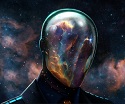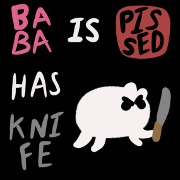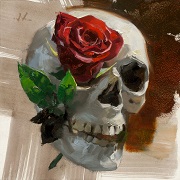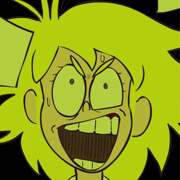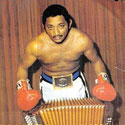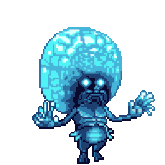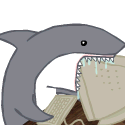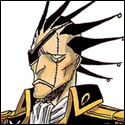|
Kalman posted:Is there something they're trying to tell us about Scalzi??? Why would they list anything for Friedman over In Conquest [loving] Born!?
|
|
|
|

|
| # ? May 30, 2024 12:58 |
|
I just finished the Malazan series. I loved but I'm getting the impression that a lot in this thread don't like it.. why is that or am I just wrong?
|
|
|
|
Buca di Bepis posted:You misread it. I'm not going to read those books but I'm curious so: how's that?
|
|
|
|
vulturesrow posted:I just finished the Malazan series. I loved but I'm getting the impression that a lot in this thread don't like it.. why is that or am I just wrong? I personally couldn't stomach how grueling that series was. I got halfway through the third book and just couldn't continue. Now, I mean, I'll give it another shot someday when I'm prepared for houses packed with dead people, but that day is not today.
|
|
|
|
vulturesrow posted:I just finished the Malazan series. I loved but I'm getting the impression that a lot in this thread don't like it.. why is that or am I just wrong? I loved it, after reading it for the first time earlier this year. There's a specific Malazan thread too, which is one reason I think there's not so much talk about it here.
|
|
|
|
vulturesrow posted:I just finished the Malazan series. I loved but I'm getting the impression that a lot in this thread don't like it.. why is that or am I just wrong? I liked it a lot at the beginning (especially book 1) but by about book 8 or so I felt it had gone off the rails and was collapsing under the combined weight of the accumulated plot and the narrative voice's ego.
|
|
|
|
cptn_dr posted:I loved it, after reading it for the first time earlier this year. There's a specific Malazan thread too, which is one reason I think there's not so much talk about it here. I know there is a separate thread but I've pretty much avoided it so I didn't spoil anything. I just remembered a few comments in this thread that made me think maybe people didnt like it so much . fritz posted:
I can see that although I don't completely agree. But given the ambitious scope of the series I feel like some of that is unavoidable. I wasn't completely satsified at the end, in particular I really didnt like the resolution of Icarium's plot thread. That said Id be thrilled if he wrote an epilogue trilogy. Are the other Malazan books worth a read?
|
|
|
|
vulturesrow posted:That said Id be thrilled if he wrote an epilogue trilogy. Are the other Malazan books worth a read? I can't comment on the other Erikson written Malazan books yet, but I gave up on the ICE ones. Re: epilogue trilogy, I believe he's planning on writing a sequel trilogy about Karsa after he's finished the Kharkanas trilogy.
|
|
|
|
vulturesrow posted:I just finished the Malazan series. I loved but I'm getting the impression that a lot in this thread don't like it.. why is that or am I just wrong? A lot of the complaints centered around not having summary or large expository core dumps regarding many of the worldbuilding aspects of the series and plotlines. You experience things and then parse it as best you can given the limited information, and through further reading you can slowly build a patchwork of information about the world surrounding the events as they happen. Your understanding of Malazan fleshes out slowly, like you're an archeologist digging through an ancient settlement. People said the series felt jumbled together and had too many characters that were too hard to keep track of and their individual stories didn't have a clear resolution and/or were too long in general. I think these are all valid reasons for personally not enjoying the books - the expectation of getting Brandon Sanderson and his rulebook writing but instead getting Steven Erikson and his anthropology. I think they are completely invalid reasons for calling the series bad. It's quite the opposite. I think Erikson's books require some active reading, and in order to really get the series you need to puzzle through it a bit. If you enjoyed the style and experience of reading the series, Glen Cook's The Dragon Never Sleeps is also an amazing read - but Science Fiction/Space Opera rather than Epic Fantasy. I've not read the Kharkanas trilogy, is it any good?
|
|
|
|
Drifter posted:I think these are all valid reasons for personally not enjoying the books - the expectation of getting Brandon Sanderson and his rulebook writing but instead getting Steven Erikson and his anthropology. I think they are completely invalid reasons for calling the series bad. It's quite the opposite. The kharkanas series, 2 books are out is good if you like erikson. A little wordy and needs the main series to make sense. As for the Sanderson type of book. My main irritation with that type of books is how everything works is setup before the end and you just know that the end is going to be that special snowflake character that doesn't obey the stated rules.
|
|
|
|
Drifter posted:I think Erikson's books require some active reading, and in order to really get the series you need to puzzle through it a bit. If you enjoyed the style and experience of reading the series, Glen Cook's The Dragon Never Sleeps is also an amazing read - but Science Fiction/Space Opera rather than Epic Fantasy. Yeah that was where I got a lot of enjoyment out the series from, gaining that growing understanding of how the different players fit into the overall story and really liked how as you learned more a lot of what you thought you knew wasn't quite right or even outright wrong. Obviously he deliberately leads you down those paths but all in all Id say it takes some talent as a writer to pull that off. I might go back and read the series again just to see how differently it reads when you are "in the know." Thanks for the suggestion, that one is going in the queue.
|
|
|
|
fritz posted:I'm not going to read those books but I'm curious so: how's that? IIRC (it's been a year): The main character and his squad are called in to deal with a welfare riot, since poverty is rampant planetwide (the wealth gap loving skyrocketed because apparently all the Earth's governments blew all their budgets on colonizing other planets). The rioters unexpectedly have military-grade weapons (The books I read don't explain where they got them since they're first-person limited.) and start putting up a fight against the squad, putting the guy in moral danger and killing some of his squadmates. At some point in the battle, I think he gets sniped at and the only ammo he has left is of the overkill variety, so he destroys a whole building full of people, including non-combatants. In the aftermath, the media is looking for someone to blame, and an officious major is eager to throw Grayson to the wolves until his sergeant makes the guy back off. Grayson didn't know what would happen, but the only other choice was to die from enemy fire and he doesn't regret choosing to live. He joined the army to escape life in a welfare zone himself, and I think his supposed "contempt for the welfare rats" (an informal term that isn't founded in class prejudice) stems from being tormented and threatened when he grew up there, and the fact that some of them almost killed him. It's a hosed up situation that isn't as clear cut as the narration says, but I immediately understood where everyone in it was coming from and it never read as anti-poor-people. The ideology of the series is supportive of the soldiers on the ground, romanticizing the bonds between them, and very cynical about the higher ranks who give them orders and where humanity is heading in the future. But in today's political climate I can't exactly blame someone for getting a bad taste in their mouth reading that scene.
|
|
|
|
vulturesrow posted:I just finished the Malazan series. I loved but I'm getting the impression that a lot in this thread don't like it.. why is that or am I just wrong? There's only a few people who don't like it, but those fuckers are obnoxiously vocal with their criticisms, and will swan into the thread to rant the minute someone posts something in Malazan's favour.
|
|
|
|
fritz posted:I'm not going to read those books but I'm curious so: how's that? Frontlines is kind of a weird beast, as self-published amazon MilSF goes. It's true that the books initially read as Kratman-grade alt-right agitprop. But if you keep going (which I don't necessarily recommend, as they aren't particularly good) you find out that the real bad guys are the rich and powerful. Later in the series. the protagonists establish an alliance with an urban gang/militia - possibly the mysterious force responsible for the Detroit ambush in the first book - and start collaborating against the global elites, who have absconded with vital war-material and abandoned the defense of Earth in order to set up their own idyllic fallback planet. It's implied that this was a long-running scheme, predating even the arrival of the aliens. The Sino-Russian Alliance - who are definitely a soviet-era throwback rather than any political descendant of modern Federal Russia - also get more focus later on, and are portrayed sympathetically. The author is no Ken MacLeod and probably won't be propounding Full Communism Now anytime soon. It's just that he's no John Ringo either. Also the author's depiction of an overcrowded future is pretty reminiscent of The Forever War. So, while Marko Kloos is obviously not Joe Goddamn Haldeman, quality-wise, we probably have to jump Haldeman's jock about that particular topic if we're gonna jump Kloos's. PupsOfWar fucked around with this message at 14:33 on Sep 1, 2016 |
|
|
|
vulturesrow posted:I just finished the Malazan series. If anyone is curious, the first book is available for free through the Tor.com eBook Club: quote:The Tor.com eBook Club is focused on epic fantasy this month. We're offering GARDENS OF THE MOON, the first book in Steven Erikson's complete 10-volume MALAZAN BOOK OF THE FALLEN fantasy series for free to interested readers!
|
|
|
|
GreyjoyBastard posted:Why would they list anything for Friedman over In Conquest [loving] Born!? Black Sun Rising is an easier read?  Although in that case the Magister trilogy hits a lot of the same themes but is, IMO, generally better. Although in that case the Magister trilogy hits a lot of the same themes but is, IMO, generally better.The actual answer is to just read everything by Friedman except perhaps The Wilding. She's consistently good and has only written ~10 books, so it doesn't take long. vulturesrow posted:I just finished the Malazan series. I loved but I'm getting the impression that a lot in this thread don't like it.. why is that or am I just wrong? I really enjoyed it the first time I read it, but at that point it was only done up to book 5 or 6, so I set it aside with the intent to reread the whole thing once the series was finished. Returning to it later, I found that I couldn't get through it. At the macro level, one book will get me invested in a set of characters, a setting, and a plotline, only for the next book to put that on the backburner and spend a thousand pages on something completely different and apparently unrelated (although IIRC at least some of the storylines start converging later); at the micro level, I find that either don't care about or actively dislike a lot of the characters (hi, Kasa Orlong) that the books focus on heavily, and the ones that I do like have an unfortunate habit of dying. I'm extremely curious about the worldbuilding and where the overarching plot goes, but I no longer find the actual experience of reading the books to be enjoyable, and I'm trying to be more aggressive about not reading books that I'm not enjoying just because I'm curious about where they go. I suspect I might enjoy it more if I could read, say, one book from the series a month, but that means that by the time I return to a given subplot it's been 2-3 months since I last read about it and I've forgotten all the context. I also find that in general I enjoy 10,000-page epics with dozens of storylines and characters to keep track of a lot less than I once did, possibly as a consequence of having less time to read in general.
|
|
|
|
Strom Cuzewon posted:There's only a few people who don't like it, but those fuckers are obnoxiously vocal with their criticisms, and will swan into the thread to rant the minute someone posts something in Malazan's favour. Malazan is really bad and 20,000 pages too long.
|
|
|
|
Strom Cuzewon posted:There's only a few people who don't like it, but those fuckers are obnoxiously vocal with their criticisms, and will swan into the thread to rant the minute someone posts something in Malazan's favour. Lol ShutteredIn posted:Malazan is really bad and 20,000 pages too long. But yeah, this
|
|
|
|
Actually it's really good, and only about 1000 pages too long.
|
|
|
|
ShutteredIn posted:Malazan is really bad and 20,000 pages too long. (About half my posts in this thread have been semi - hysterical rants about how much I hate Malazan)
|
|
|
|
Dust of Dreams is the worst book I ever finished. By which I mean skimmed as I tried simultaneously to stay awake and not vomit. The pain finally faded enough for me to start The Crippled God two weeks ago. I'm 20% done and expect to finish in November.
|
|
|
|
I loved the bit when Sephirot did cool things with the sword and the chase across the desert. I think Memories of Ice was really, really good, the other few books at the beginning of the series were interesting . But I lost it somewhere around Reaper's Gale, when another set of interchangeable marines got sent to another newly revealed godforsaken continent. The truth being, Malazan has some very good moments, but may not be for everyone.
|
|
|
|
mcustic posted:I loved the bit when Sephirot did cool things with the sword and the chase across the desert. I think Memories of Ice was really, really good, the other few books at the beginning of the series were interesting . But I lost it somewhere around Reaper's Gale, when another set of interchangeable marines got sent to another newly revealed godforsaken continent. The truth being, Malazan has some very good moments, but may not be for everyone. Hell, I agree with this whole post. Strom Cuzewon posted:(About half my posts in this thread have been semi - hysterical rants about how much I hate Malazan) This made me check your post history and I saw your posts 2 years ago about Dune, right now I'm trying to get through Chapterhouse and finish the whole thing finally. Heretics almost killed me, and I'm slowing down so much in Chapterhouse, but dammit I'm going to finish this garbage. I similarly try to read the last Malazan book once a year or so after reading through book 9 a long time ago, but I just can't do it. If they were all just a respectable 400-500 pages like the awful volumes of Dune, I could power through, but no luck 
|
|
|
|
RVProfootballer posted:Hell, I agree with this whole post. I still utterly love Dune despite not considering any of its philosophical ideas particularly interesting - I couldn't give much of a poo poo about the natural inclination of beurocracies towards either stagnation or tyranny, but a ruler torn by fears of stagnation or tyranny? That I can get behind. More than the first trilogy, Heretics and Chapterhouse throw out so many great ideas (face dancers losing identity, the tleilaxu frustrations with language, the HMs not even knowing what they're running from) that Herbert just never feels the need to develop. Instead he blathers on about furniture, artificial wood, and watered down beer. If we're being charitable we could say this is a demonstration of the BGs obsession with social history, but that doesn't make it any easier to read.
|
|
|
|
Solitair posted:IIRC (it's been a year): [ The main character of Terms of Enlistment is a completely flat idiot who somehow is unaware that the civilians of his world all hate the Terran Army, treats his job like a video game (which is then described like a video game) and totally gets the girl in an amazingly contrived way. If there's one thing that real world militaries love, it's fraternization. He also has no friends back home and never even gives a thought to contacting his mother, who is given even less characterization than his terrible father. Basically he's a cipher for the reader to insert into, but the cues he gives are not ones I empathize with. Nor does the book ever explore why the civilians he is making war on have chosen that path. They're just targets--the book flips from tacitly blaming the government for the immense poverty and decay to blaming the poor for resisting and fighting that government once the hero is on the winning side. Then of course the super-powerful mysterious aliens use the advanced strategy of walking straight into the humans' guns without blinking. I can understand them being kaiju-sized and just not thinking those scurrying creatures are significant, but if a group of ants managed to kill a friend of mine with tiny rocket launchers, I would probably pause and reassess the situation. I'm being somewhat harsh, this book was less preachy about its tone than a lot of milSF, but it was still very adolescent. I started the sequel which shows a little bit of character growth on the part of what's-his-name but it wasn't interesting enough that I've finished it yet. If you like milSF it's not bad I guess, and there are certainly far, far worse in the genre.
|
|
|
|
occamsnailfile posted:The main character of Terms of Enlistment is a completely flat idiot who somehow is unaware that the civilians of his world all hate the Terran Army, treats his job like a video game (which is then described like a video game) and totally gets the girl in an amazingly contrived way. If there's one thing that real world militaries love, it's fraternization. He also has no friends back home and never even gives a thought to contacting his mother, who is given even less characterization than his terrible father. Basically he's a cipher for the reader to insert into, but the cues he gives are not ones I empathize with. Nor does the book ever explore why the civilians he is making war on have chosen that path. They're just targets--the book flips from tacitly blaming the government for the immense poverty and decay to blaming the poor for resisting and fighting that government once the hero is on the winning side. The second book's best scene is the main character having a heart to heart with his mother and realizing that he's been a self-centered rear end in a top hat in how he used to think of her. However, I find it kind of funny that at this point the story has essentially become Attack on Titan IN SPACE. I gave the series a chance mostly because I admired the author for declining the Hugo and letting someone with a better novel take his place, and I think my expectations were so low that the book had no problems topping them.
|
|
|
|
Solitair posted:The second book's best scene is the main character having a heart to heart with his mother and realizing that he's been a self-centered rear end in a top hat in how he used to think of her. However, I find it kind of funny that at this point the story has essentially become Attack on Titan IN SPACE. This is also why I read it. I want to finish the trilogy but it's hard to make it a priority when The Obelisk Gate is out and I still have Ninefox Gambit to read and Death's End is hitting soon and--
|
|
|
|
Now my book club is hashing out some fantasy options, and I'm curious, I feel like I've read here that Terry Goodkind books are really not very good... Or Terry Brooks, I can't remember. Which was it, and why? I've talked the group out of doing any Robert Jordan books because frankly I'm not that interested in Wheel of Time, but they turned to Terry Goodkind as an option when I shot down Jordan. Nobody in the group has read any of his stuff, though.
|
|
|
|
|
MockingQuantum posted:Now my book club is hashing out some fantasy options, and I'm curious, I feel like I've read here that Terry Goodkind books are really not very good... Or Terry Brooks, I can't remember. Which was it, and why? I've talked the group out of doing any Robert Jordan books because frankly I'm not that interested in Wheel of Time, but they turned to Terry Goodkind as an option when I shot down Jordan. Nobody in the group has read any of his stuff, though. Terry Brooks wrote The Lord of the Rings But Not over and over and over and.... Terry Goodkind is the worst published writer of fantasy fiction and possibly the worst published writer of any type of fiction. Terry Goodkind's death chicken posted:Hissing, hackles lifting, the chicken's head rose. Kahlan pulled back. Its claws digging into stiff dead flesh, the chicken slowly turned to face her. It cocked its head, making its comb flop, its wattles sway. "Shoo," Kahlan heard herself whisper. There wasn't enough light, and besides, the side of its beak was covered with gore, so she couldn't tell if it had the dark spot, But she didn't need to see it. "Dear spirits, help me," she prayed under her breath. The bird let out a slow chicken cackle. It sounded like a chicken, but in her heart she knew it wasn't. In that instant, she completely understood the concept of a chicken that was not a chicken. This looked like a chicken, like most of the Mud People's chickens. But this was no chicken. This was evil manifest. ShutteredIn fucked around with this message at 05:33 on Sep 2, 2016 |
|
|
|
But what if you're into fantasy where a thinly-veiled rapist Bill Clinton sells out a thinly-veiled fantasy America to a thinly-veiled racist caricature of the Chinese? How will your needs be satisfied?
|
|
|
|
Oh dear. Terry Goodkind in a book club. I find the notion fascinating, so I feel like I can't recommend you avoid it. I do feel obliged to ask how uncomfortable your group would be if there were hypothetical sadomasichistic sex ninjas? Also evil chickens?
|
|
|
|
If you do read Terry Goodkind in your book club (it'll make for a discussion), please steal the books.
|
|
|
Velius posted:Oh dear. Terry Goodkind in a book club. I find the notion fascinating, so I feel like I can't recommend you avoid it. I do feel obliged to ask how uncomfortable your group would be if there were hypothetical sadomasichistic sex ninjas? Also evil chickens? I actually feel like we'd have less of an issue with that then the blatant Objectivism.
|
|
|
|
|
MockingQuantum posted:Now my book club is hashing out some fantasy options, and I'm curious, I feel like I've read here that Terry Goodkind books are really not very good... Or Terry Brooks, I can't remember. Which was it, and why? I've talked the group out of doing any Robert Jordan books because frankly I'm not that interested in Wheel of Time, but they turned to Terry Goodkind as an option when I shot down Jordan. Nobody in the group has read any of his stuff, though. Brooks is kind of banal in that he started copying Tolkien before that became a big thing, so the first dozen or so of his books are rehashes of LotR except set in a post-apocalyptic fantasy future where the monsters include malfunctioning cyborgs instead of fel beasts and orcs. Eventually he goes full on JRPG with crystal-powered airships and returning technology and stuff, but his prose doesn't really improve noticeably over four decades, which is almost impressive in a weird way. Dude does not want to change his voice at all and his post-2000 stuff still feels just like his late 70s books. It's inoffensive but also incredibly bland. Goodkind is uh... Well, what is your book club's tolerance for things like demon dog nun rape, BDSM ninjas, evil chickens, really blatant Ayn Rand love letters -- one of the books is literally just a rehash of The Fountainhead except it ends with the libertarian ubermensch building a magical statue to remind the peasantry just how awesome the nobility is and inspires them to rise up against the communist fellowship in charge of the city who enforce evil edicts like "you should help each other" and "care for those less fortunate than you" -- and the hero getting props for kicking a ten year old girl so hard in the face that she bites off her own tongue and breaks all her teeth. It would honestly read like a fantasy deconstruction of objectivism where the protagonist slowly becomes a supervillain if Goodkind himself wasn't a very outspoken Rand fan and creepy misogynistic twerp.
|
|
|
Mandragora posted:Brooks is kind of banal in that he started copying Tolkien before that became a big thing, so the first dozen or so of his books are rehashes of LotR except set in a post-apocalyptic fantasy future where the monsters include malfunctioning cyborgs instead of fel beasts and orcs. Eventually he goes full on JRPG with crystal-powered airships and returning technology and stuff, but his prose doesn't really improve noticeably over four decades, which is almost impressive in a weird way. Dude does not want to change his voice at all and his post-2000 stuff still feels just like his late 70s books. It's inoffensive but also incredibly bland. Seriously this makes me want to at least add Sword of Truth to our list, except for the fact that there are so many genuinely good books that we want to read. If anyone's mildly curious, our September book is Ancillary Justice, October is Lies of Locke Lamora (and we're actually considering reaching out to Scott Lynch to see if he can grab lunch afterwards, given that he lives 20 miles away and is a friend of a friend), and right now I'm pushing for November to be Bridge of Birds since I'm the only one that's read it.
|
|
|
|
|
I read Debt of Bones, the Sword of Truth story included in the Legends collection. It doesn't have much of the horrific stuff you guys are talking about, but I'm guessing that's because the editors forced him to pretend that this was the product of someone self-aware. They still failed because it came off as some of the most edgelord fantasy I've ever read.occamsnailfile posted:This is also why I read it. I want to finish the trilogy but it's hard to make it a priority when The Obelisk Gate is out and I still have Ninefox Gambit to read and Death's End is hitting soon and-- It's not a trilogy. I was right on your exact train of thought when I noticed that there was a fourth book and decided I'd read enough for the moment. Solitair fucked around with this message at 06:29 on Sep 2, 2016 |
|
|
|
Drifter posted:I've not read the Kharkanas trilogy, is it any good? If you ask me it's the highest point of the overall thing and a pure pleasure to read line by line, page by page. My copy is filled with notes because how everything is important. Erikson writing quality steps up some more, it's even more lucid in how he deals with themes and makes them resonate, it's deeper and more meaningful than ever. One could say it's a more conscious "literary" attempt compared to the main series, something Erikson writes to be proud about, more than give his public what the public expects. But the breaking point for most readers is that it's very dense, thoughtful and less plot focused. It has a very different feel if you come from the main series. So if you expect big battles, revelations on every page and a fast pace this new series will betray those expectations. But it improves a lot characterization and impact. It's has a different cadence, it's more subtle and measured. It's definitely not just "more Malazan", even if themes carry over the tone is completely different. If you care for the more complex aspects of the mythology then this book is just made of greatness. It's more "Gene Wolfe" kind of complexity, and that stuff can be dense and unfun to read for a lot of readers who just don't like to engage with that sort of abstraction and conceptual themes. Those pages they find dull and they "skim read" are the parts that satisfy me the most and where what's meaningful truly happens. No one deals with magic the same way Erikson does, outside of Bakker and a little bit of Janny Wurts. Magic as a system of meaning rooted on reality and actual human condition. In other cases magic is just magic, a form of pure invention used for spectacle and not much else, instead of being rooted into some core truth (again same as Gene Wolfe's layered complexity, with the difference that Gene Wolfe complexity is sometime so obfuscated that you have no ways to decode it, so it's pointless). So I worship these authors because there's absolutely nothing like that, and I doubt we'll see more of that even in the future since writing "trends" tend to go in the exact opposite direction (unsubtle, explicit, loud, and in general less pretentious escapism). Abalieno fucked around with this message at 08:02 on Sep 2, 2016 |
|
|
|
I would have said the reverse - that Warrens are a clunky DnD type magic system, and that Erikson is too obsessed with the minutiae of how it works to give any meaning to it - worsened by the fact that his explanations are pure gibberish: Quick Ben beats Baudelino (Bauchlard?) by folding his Warrens up on each other, whatever the heck that means. And when he does try to give it some meaning it's pure abstraction that is utterly divorced from any of the characters - the emotional climax of the Imass plot in MoI is them storing their memories in a Warren after Itkovian magically removes their fears and doubt. Which isn't exactly a compelling character drama.
|
|
|
|
RVProfootballer posted:This made me check your post history and I saw your posts 2 years ago about Dune, right now I'm trying to get through Chapterhouse and finish the whole thing finally. Heretics almost killed me, and I'm slowing down so much in Chapterhouse, but dammit I'm going to finish this garbage. I similarly try to read the last Malazan book once a year or so after reading through book 9 a long time ago, but I just can't do it. If they were all just a respectable 400-500 pages like the awful volumes of Dune, I could power through, but no luck I'm going to go out on a limb and suggest that people start reading more of Herbert's non-Dune works. Under Pressure is an amazingly psychological tale of people under, well, pressure literally and figuratively. It's the only "sci-fi submarines" book I'll put above Passage at Arms. A shrink is inserted in the crew of a Navy sub that is going to sneak under the ice cap and steal Russian oil. Whipping Star/The Dosadi Experiment. The one is a weirdly structured novel that's about exactly what it says on the tin: someone is literally whipping an actual star to actual death. The protagonist - an ace agent of the Bureau of Sabotage (they operate against their own government) - falls in love with her despite their totally different worldviews. The other is very possibly the first cyberpunk novel. The protagonist from the first book is sent on assignment to a secluded research planet where a captive population is being bred under insanely deadly conditions. The natives make Sardukaur look like a cub scout troop, and the superspy sent to check in on them look like a Benny Hill parody of a John LeCarre novel. The legal customs and practices of a species of frog people play a major role in the plot, but that's ok because in a Gowachin courtroom a good lawyer can find an excuse to kill any participant.. Both books are set in the PanSentiency, a setting that I've always thought was the one that deserved seven books. Destination: Void. Again, people are put under extreme pressure in hopes of capturing an emergent outcome. Kind of a theme of Herbert's. In this one a crew of clones are sent out on a generation ship to another star. They are forced into a situation where only building an AI out of analog components can let them successfully complete the voyage. AI research has been conducted off planet ever since that one island disappeared. And all the weird deaths and unexplained phenomena. The sequels are all really good and build up through generations of colonists (spoiler ?) to bring humanity to a form of enlightenment.
|
|
|
|

|
| # ? May 30, 2024 12:58 |
|
Strom Cuzewon posted:I would have said the reverse - that Warrens are a clunky DnD type magic system, and that Erikson is too obsessed with the minutiae of how it works to give any meaning to it - worsened by the fact that his explanations are pure gibberish Because the magic system in Malazan is anti-mechanical. It's strictly the opposite of science. You won't grasp it if you parse it in a traditional way like a system of fixed rules in a roleplaying game. To explain the core of it I'd have to talk about philosophical concepts like "dualism" and an anthropocentric conception of reality. The thing is: Malazan "spawns" from Donaldson's Thomas Covenant (it's not inspired by it, being completely different, but it's conceptually hanging from the same branch of the same tree). Thomas Covenant is like a pre-modern version of fantasy, coming from a certain romantic tradition. That means, in the fewest words possible: the fantasy world doesn't *exist* as external, objective reality, as we assume our own world, but it's just a "projection" of an internal mental or soul state. A mental "landscape" that turns concrete. Tangible objects and creatures you see are not simply tangible objects, but symbols. As it happens within a dream. The fantasy world is essentially like The Matrix, an artificial construction that closes around you. The writer consciously traps himself within this system he himself created, then "seals" the dome with some horizon occlusion. Malazan moves from there, if you frame it as post-modern. It has a metalinguistic frame, observing the observation. Observing the world as an artificial creation. It's like Covenant's world, but moved on, looking at that world not from the inside (as Covenant, trapped within) but from the outside, like a writer, writing, observing himself writing. The main plot is hidden, because it's a "shadow" of the text. A lot of this is even amusing wordplay, just for "fun" (see Shadowthrone and Pust, or even Lady Envy, or Kruppe a little bit, being conscious of the "meta" and rolling with it, hovering just a tiny bit above rules without completely breaking them). The magic in Malazan doesn't make sense traditionally because it's not a traditional mechanic. It's not "rules of physics with a fantasy bent". Magic in Malazan is pure meaning. Wherever meaning coalesces, magic becomes real and tangible instead of just an abstraction. Even the sedimentation of a strong emotion of a small community can potentially give birth to a small god (like the Cthulhu thing in book 5). The same as in reality we are driven by powerful symbols and meanings, that give us identity and drive. That construct our lives, creating differentiations as a linguistic system (see constructivism or even some Wittgenstein). Malazan takes this concept and makes it into something tangible instead of purely conceptual. So, the important aspect to understand magic in Malazan is to observe how it transformed and evolved in the world. You notice how there are "old" gods and new gods. And you notice how the old gods have proprieties that are simply deduced from the societies that produced those gods. Very simple example: if the populations were sedentary or migratory. Essentially: all the gods in Malazan "behave" functionally as real gods in our own world. They are projections of cultural "meaning". And that's what you observe in the evolution of society within the Malazan world, the more it becomes "civilized" the more the gods become blurred, more subtle, representing more complex concepts. Gods evolve along the society that gave them birth. That, if you want to stay concrete, means that the relationship between gods and worshipers is circular. Belief shapes gods, gods have influence on believers. They use and are being used (see what Heboric does to Fener). It's always a system of meaning, and it again comes from a fantasy world that is built as an anthropomorphic creation. A body, that Erikson SHOVES in your face when he tells you magic begins with Krul, who's a god, who created magic with his own body. Or even with Erikson's version of "gaia" the earth: Burn. Or the Mhybe, that is the MOST important thing within all Malazan. A woman who becomes a world. Krul creates differentiations within his body, going from chaos to law. To rules. To systems (or same as the Crippled God has to enter the Deck of Dragons in order to "play" the game, where "playing the game" is yet another metalinguistic pun, since we're talking of a card game based on tarots). Exactly like a cultural system, or the evolution of civilization. So, as in Thomas Covenant the "fantasy world" is a body. An anthropomorphic creation. A filter, a lens you use to observe human life, through human life, through the act of writing (and act of reading as a surrogate of it, or, like, parasitic, or like a bird perched on Erikson's shoulder observing what he's doing with the hope of understanding some of it). Like a linguistic system the Malazan magic has a diachronic dimension that is even more important than synchronic aspects: it's ever-evolving. That again means this fantasy world is built as human-sized (even when it project human fears or human struggles, that look inhuman, it's always circular. Same as even the most inhuman species are still kind of human representations anyway). Whereas our own would is (supposedly) built on science. Rules, math. Stuff that is alien to a human dimension, that you can only try to grasp, but that is qualitatively different. (see Heboric flying with the Jade statues in book 4, those statues represent something closer to our world) Something that David Foster Wallace also writes about and defines: "the widening gap between knowledge and experience". Or: post-modernity. Trying to come to terms with a world that makes no "sense" anymore. Bakker writes the same stuff, but from a different angle. So it's like if it's complementary and opposite to Malazan. This is the stuff I like. If you know more of this kind I'd love to hear about it. Sadly I really haven't found anything that comes close... (well, Evangelion, Donnie Darko, Upstream Color, Battlestar Galactica and LOST, these do certain things on the same line with their mythology, but none do it as well and, MOST OF ALL: *coherently* as Malazan) Abalieno fucked around with this message at 10:39 on Sep 2, 2016 |
|
|





